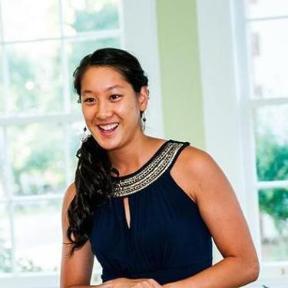Moire Yue, PT, DPT '12
 Medicine is often mistaken as strictly black-and-white—but my work as a physical therapist holds an immeasurable amount of uncertainty. In my hospital, I am part of a team with physicians, nurses, and other therapists that provide comprehensive care to critically ill patients. In the ICU, PTs promote physical and cognitive activity to address current impairments and prevent secondary complications. This is known as “Early Mobility,” a rising establishment for ICUs across the world, and a challenge to the traditional thinking that critically ill patients simply need bedrest.
Medicine is often mistaken as strictly black-and-white—but my work as a physical therapist holds an immeasurable amount of uncertainty. In my hospital, I am part of a team with physicians, nurses, and other therapists that provide comprehensive care to critically ill patients. In the ICU, PTs promote physical and cognitive activity to address current impairments and prevent secondary complications. This is known as “Early Mobility,” a rising establishment for ICUs across the world, and a challenge to the traditional thinking that critically ill patients simply need bedrest.
It’s hard to describe my work because of the ever-changing hospital environment. Every day, we face challenges ranging from respiratory failure to strokes, open heart surgeries to amputations, alcohol withdrawal to spinal cord lesions. Infrequent but real medical mistakes are difficult to deal with, and our team faces more patient deaths than we would like. On the flip side, it’s encouraging when someone makes his or her way out of the ICU and eventually to rehab or home. It gives me pure joy to walk alongside these people in, often, their most vulnerable situations.
I can say confidently that each part of my Wheaton experience contributed to my career. The Applied Health Science department prepared me academically, but it was the influence of Dr. Susan Vendeland that urged me to identify a unique vision to carry forward. While taking her Prevention of Obesity & Eating Disorders course and serving as her teaching assistant, I developed a holistic perspective on health. Cultivating this mindset was the main reason I took on a psychology minor and subsequently learned how medicine goes beyond science. To be an effective healthcare provider, one must appreciate the emotional, social, and spiritual dimensions of well-being. One class that influenced how I integrate this into my work is Personality Psychology. She taught us how to read our self and the self in others, which is a crucial skill for meeting the needs of patients.
As a sophomore, I served with Diakonoi to provide daily campus tours. Little did I know that the skill of building rapport with complete strangers would be useful years later at my job. Bedside manner requires much creativity and is often the biggest barrier in medicine. Sadly, not all patient-therapist relationships work despite the effort and time put into it. During my years of swimming for Coach Lederhouse, I learned that diligence didn’t promise success. Some swimmers worked unbelievably hard yet did not see its results. Others accomplished much with less work ethic and an unfortunate lack of zeal.
In a similar vein, the “injustice” of seeing some patients suffer incredulously while others healed easily brought much anxiety when I first started working. Through much pain, I now see God’s command for me: to do my missional work without carrying the burden of either good or bad outcomes; and to remember that every minute spent with a patient, even if they pass, was eternally valuable. For our purpose on earth is not to achieve nor produce, but to do the will of Him who sent us (John 6:38-40).
Moire Yue ’12 graduated from Wheaton with a bachelor of science in Applied Health Science and a minor in psychology. She currently works as a physical therapist at Providence St. Vincent Medical Center in Portland, Oregon. Her areas of expertise are in the hospital’s three critical care units. Like in this photo below, PTs walk patients as early as day 1 after open heart surgery.